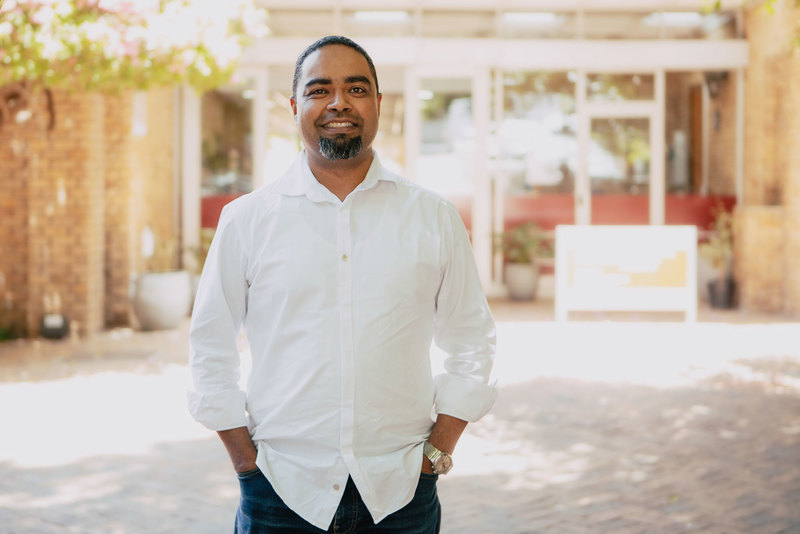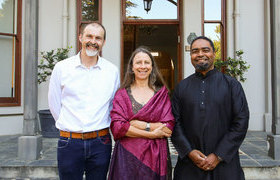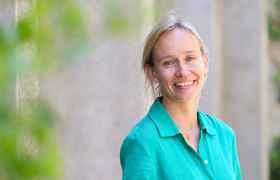Distinguished teacher cultivates hope in a hopeless world
06 December 2023 | Story Niémah Davids. Photo Robyn Walker. Read time 8 min.
“Education is fundamentally a hopeful endeavour. The fruits of our labour manifest in an unknown future, which is where hope lives. I write this at a time when the world is almost without hope and faced with a human-made tragedy of immense proportions in Gaza. I take strength [in] the resolve of oppressed people across the world, who have taught us that despite the most dire situations, it is impossible to extinguish a hope-filled heart,” said the University of Cape Town’s (UCT) Associate Professor Tasleem Ras.
So, Associate Professor Ras from the Division of Family Medicine in the Faculty of Health Sciences, enters his teaching spaces – located in clinics and hospitals across the Mother City, with a smile every day – to teach a diverse cohort of students from various walks of life. As their teacher, his objective is to impart knowledge, develop critical thinking, and create engaging spaces of learning where trust, empathy and respect thrive. But the mainstay of his teaching approach is to inspire hope in a world where there’s not enough to get by. And this teaching philosophy has definitely counted in his favour.
For his unique teaching approach and for his commitment to his students, Ras was named one of three recipients of UCT’s 2022 Distinguished Teacher Award – the university’s highest teaching accolade. This year, he shares the award with two university colleagues, Dr Marcin Nejthardt from the Department and Anaesthesia and Perioperative Medicine; and Associate Professor Pippin Anderson from the Department of Environmental and Geographical Sciences.
“Education in a harsh clinical environment like this one needs to be empathetic and wise.”
“Education in a harsh clinical environment like this one needs to be empathetic and wise, rather than judgmental and unyielding, and I need to create these spaces for my students,” he said.
On a breezy afternoon, with Table Mountain and Devil’s Peak in the background, UCT News caught up with Ras to talk about his teaching style, his relationship with his students, and how important this esteemed award is to him, both personally and professionally.
Niémah Davids (ND): How did you get into teaching?
Tasleem Ras (TR): I joined UCT in 2010 after spending seven years in private practice. I then established the interdisciplinary rural training platform aimed at undergraduate students, as well as health and rehabilitation colleagues. Prior to that, while still in private practice, I taught undergraduate MBChB students the “Becoming a Doctor” course part-time.
After a three-year stint working for the provincial Department of Health, I rejoined UCT as a convenor of postgraduate programmes in the Division of Family Medicine in 2015. I’ve been in this position since then.
ND: What do you teach and to whom?
TR: I convene and teach two programmes: The Postgraduate Diploma in Family Medicine, which is aimed at clinicians (nurses and doctors) who work in primary healthcare. The second one is the MMed in Family Medicine, where we train registrars to become consultant family physicians. I also do a bit of teaching in the Master’s in Public Health course, and the MPhil in Palliative Medicine.
ND: How would you describe your teaching style?
TR: I structure my lectures around how adults learn, so predominantly use experiential learning as the basis of my pedagogy. This means that clinical encounters are a focal point of our teaching methodology. Because family medicine often operates in the primary healthcare environment, we are constantly faced with the complexity of teaching and being clinicians who are at the interface of community, health and educational systems, and each of these have their own competing demands and multiple variables. As such, family medicine is intimately engaged with issues of poverty and inequality, which inform our clinical practice and teaching.
ND: What do you love most (and least) about working with students?
“The most rewarding aspects of teaching is when students realise their own potential, and when their perspectives of the world in which they live are transformed as a result of their learning.”
TR: The most rewarding aspect of teaching is when students realise their own potential, and when their perspectives of the world in which they live are transformed as a result of their learning. Embracing this transformative lens means that we also acknowledge the emotional and social journey that students are on, and it’s important that we respond to it. Engaging with students beyond the profession is daunting and exposes my vulnerability. However, it means that I am also constantly evolving and growing.
Finally, what I love least has got to be the many hours of admin that accompanies the life of a convenor.
ND: How has your relationship with your students, your teaching style and subject matter changed over time?
TR: I have become more confident as an educator. This means that I understand the role I play with affirming my students’ strengths, while providing constructive feedback to fill their gaps. This also means that I can take a step away from the sole role of senior clinical expert. The relationship has become one where I have evolved into the expert facilitator of learning, and professional identity formation. I feed off the growing technical expertise of my students and emphasise their role as teachers in this regard.
ND: What are the challenges of teaching in a world driven by artificial intelligence (AI)?
TR: In clinical medicine, the safety of patients is paramount. So, until clinical AI algorithms are validated in the real world, the clinician would always need to make the final decision, navigating the clinical complexity that each patient presents with. The key limitation with AI is dealing with the unknown – things that have not been encountered before. And in the case of family medicine, this is represented by the undifferentiated patient.
ND: Which other stumbling blocks in your career have shaped you as a teacher?
TR: My own training was foregrounded on technical competence and not on developing a professional identity. I recognise this when faced with significant personal and ethical challenges that my training has not prepared me for.
Additionally, I was trained in an era of “learning by public humiliation”, which convinced me about the many weaknesses this approach has. And that’s why I maintain that education in a harsh clinical environment needs to be empathetic and wise.
ND: How significant is this DTA to you?
TR: It is extremely significant. I am a first-generation university graduate. My parents were denied opportunities in higher education because of apartheid. And to be nominated by a student, and to be witness to the testimonies of other students and colleagues is already an honour in itself.
“I dedicate this award to my parents, whose unwavering commitment to education as a liberatory activity has paved the way to this moment.”
I dedicate this award to my parents, whose unwavering commitment to education as a liberatory activity has paved the way to this moment. I acknowledge my wife, children, siblings, students, friends and colleagues for their role in all of this. We are all inextricably woven into each other’s life journeys.
 This work is licensed under a Creative Commons Attribution-NoDerivatives 4.0 International License.
This work is licensed under a Creative Commons Attribution-NoDerivatives 4.0 International License.
Please view the republishing articles page for more information.










